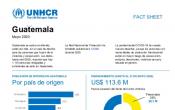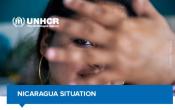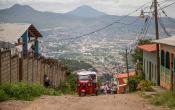Panama Multi-Country Office
UNHCR's Office in Panama covers operations in Belize (since 2018), Cuba, El Salvador, Guatemala (until 2019), Honduras (until 2019) and Nicaragua.
Operation: Panama Multi-Country Office
Location
{"longitude":-80,"latitude":8,"zoom_level":5,"iso_codes":"'BLZ','CUB','GTM','HND','NIC','PAN','SLV'"}
By clicking on the icons on the map, additional information is displayed.
The boundaries and names shown and the designations used on this map do not imply official endorsement or acceptance by the United Nations.
Key figures Panama
| 2019 year-end figures | |
| 72,400 | individuals were assisted through the “safe spaces” network in Guatemala (including 4,000 children) |
| 24,000 | people of concern in 55 communities benefitted from community-based interventions in El Salvador and Honduras |
| 12,000 | Venezuelans were supported under the inter-agency regional refugee and migrant response plan in Panama |
| 1,000 | individuals were referred for resettlement and other solutions in Australia, Canada and the United States |
| 2020 planning figures | |
| 80% | of targeted households will have their basic needs met with multi-purpose cash grants or voucher in the region |
| 80% | of people of concern will receive legal assistance and support |
| 75% | of people of concern will be registered on an individual basis |
| 60% | of targeted people of concern will be self-employed and provided with livelihoods opportunities |
| 20,000 | people of concern will be provided with accommodation in reception and transit centers |
Latest Updates and Related Links
People of Concern
21%
Increase in
2019
2019
| 2019 | 586,131 |
| 2018 | 484,586 |
| 2017 | 375,326 |

[["Refugees",3693],["Asylum-seekers",20772],["IDPs",318590],["Others of concern",127307],["Venezuelans displaced abroad",115769]]
Loading ...
Panama Multi-Country Office
< Back
2019
{"categories":[2015,2016,2017,2018,2019,2020],"budget":[8.225381364,16.64769407,22.672193686,27.00111865,63.738570732,43.70763066],"expenditure":[4.39118839,9.23860236,12.70058696,19.026620809999997,23.54673411,null]}
{"categories":[2015,2016,2017,2018,2019,2020],"p1":[8.225381364,16.64769407,22.672193686,27.00111865,63.738570732,23.368350890000002],"p2":[null,null,null,null,null,null],"p3":[null,null,null,null,null,null],"p4":[null,null,null,null,null,20.33927977]}
{"categories":[2015,2016,2017,2018,2019,2020],"p1":[4.39118839,9.23860236,12.70058696,19.026620809999997,23.54673411,null],"p2":[null,null,null,null,null,null],"p3":[null,null,null,null,null,null],"p4":[null,null,null,null,null,null]}
Loading ...
CHOOSE A YEAR
- 2015
- 2016
- 2017
- 2018
- 2019
- 2020
Operational context
In 2019, ongoing high levels of violence and crime in the north of Central America (NCA) continued to lead to displacement. While refugee and migrant ‘caravans’ occurred in the first quarter of the year – causing tensions with local communities and a challenging humanitarian situation - refugees predominantly opted to flee spontaneously or in small groups to avoid drawing attention.To address this complex situation, UNHCR supported the State-led regional comprehensive protection and solutions framework (MIRPS) initiative to implement the Global Compact on Refugees in the region. El Salvador joined the MIRPS in mid-2019 and later assumed the pro tempore presidency. South–south cooperation was also strengthened through the MIRPS, including through twining missions between Belize and Costa Rica.
The United States of America (United States) signed asylum cooperation agreements with the Governments of El Salvador, Guatemala and Honduras, resulting in the potential for increased transfers of people of concern from the United States to these three countries. By the end of the year, transfers were operational to Guatemala only.
The social and political crisis in Nicaragua since April 2018 and the unfolding crisis in the Bolivarian Republic of Venezuela also affected Central American countries, particularly in Costa Rica and Panama.
In Cuba, UNHCR continued to advocate for the ratification of the 1951 Refugee Convention and provided access to international protection through mandate refugee status determination (RSD) procedures.
UNHCR partnered with regional and sub-regional organizations such as the Central American Integration System (SICA), the Organization of American States (OAS) and the Central American Council of Ombudspersons, to enhance coordination in responding to and mitigating the causes and impact of displacement. Partnerships with IOM and UNICEF supported operational response plans across seven countries, together with common information management products.
Population trends
With a total of over 469,300 refugees and asylum-seekers having fled the NCA by the end of 2019, all countries in Central America were affected as either a place of origin, transit or destination for people with international protection needs. Moreover, some 320,000 persons were displaced internally in El Salvador and Honduras.The situation in Nicaragua resulted in large-scale displacement, with over 71,500 asylum-seekers and refugees fleeing to countries worldwide between April 2018 and December 2019, an average of 4,000 per month. This included 43,400 Nicaraguans who sought asylum in Costa Rica and some 7,600 in Panama, where there in addition are 115,800 Venezuelans displaced abroad. In Belize, UNHCR estimated there were over 5,600 refugees, asylum-seekers and others of concern in 2019.
Achievements
- Nearly 2,200 people received cash transfers and psychosocial support and approximately 800 received legal assistance in Panama.
- Over 50 private companies implemented the “Talent without Borders employability programme”, which benefitted more than 100 people of concern and 40 Panamanians.
- Over 200 people of concern to UNHCR in Cuba (82% of the total) were provided with RSD and cash transfers to meet essential needs.
- 400 households received cash transfers in El Salvador, including more than 60 young entrepreneurs and 70 women participating in women-led community groups.
- Through a participatory approach, profiling of the internally displaced population was updated in Honduras. With support from UNHCR, a draft IDP law was delivered to Congress, and progress was made in the establishment of a registry for property abandoned due to internal displacement.
- In Guatemala, asylum-seekers were granted work permits, which were previously only available to recognized refugees. UNHCR supported the private and public sector initiative Turi Integra, which provided asylum-seekers and refugees with training and employment opportunities.
- Belize opened a new Resource Centre in Benque, a strategic location close to the border where asylum-seekers have access to key information about the asylum process. The resource center also serves as shelter for vulnerable asylum-seekers.
Unmet needs
The Panama multi country office was only 47% funded in 2019, and as a result the operations could not build up programmes to sufficient scale. This affected the implementation of comprehensive livelihoods and cash transfer programmes; the establishment of additional safe houses for persons at heightened risk; the establishment of data analysis capacities across all operations; and support to address child protection needs, including full best interests assessment/best interests determination processes, access to education and psychosocial support.Operational Environment
UNHCR’s Regional Office in Panama ensures the overall coordination of the Regional Protection and Solutions Strategy for the North of Central America (NCA) situation and supports the implementation of the regional application of the CRRF. UNHCR now has fully-fledged national offices in Belize, El Salvador, Honduras and Guatemala and maintains a small presence in Cuba for protection activities. The Regional Office in Panama also has oversight over offices in Costa Rica and covers also Nicaragua where it has no operational presence.The growing trend of forced displacement from and within El Salvador, Guatemala and Honduras continues unabated, with almost 310,000 refugees and asylum-seekers from the NCA registered by mid-2018, an increase of 54 per cent compared to the same period last year and a tenfold increase over the past five years.
While displacement in and from the NCA is multifaceted and has multiple causes, violence and insecurity continues to be a major factor compelling people to move. Traditionally, people from the NCA countries seek international protection in Canada and the United States of America. However, in recent years, UNHCR has witnessed a significant increase in the number of asylum-seekers from the NCA in Belize, Costa Rica, Mexico and Panama. Guatemala is also increasingly being perceived by people of concern as a country of asylum, not only of transit. The recent crises in Venezuela and Nicaragua have put additional pressure on national asylum systems in the hosting countries.
In 2019, UNHCR will continue to reinforce its protection responses in the region, strengthening asylum systems, reception conditions and immediate humanitarian assistance through cash-based interventions. At the same time, livelihood initiatives will be stepped up in asylum countries to support local integration and peaceful coexistence with host communities.
Data on internal displacement due to violence in the NCA remains fragmented, although El Salvador has recently released a study on the topic and Honduras is in the process of updating the 2014 profiling exercise.
In 2019, the CRRF approach will be rolled out further in the region, with a view to forge new alliances with regional development actors and the private-sector. The six participating States (Belize, Costa Rica, Guatemala, Honduras, Mexico and Panama) will be supported to comply with their commitment to further consolidate existing regional collaboration by strengthening responsibility-sharing and enhancing protection of asylum-seekers, refugees and IDPs.
Key Priorities
In 2019, UNHCR will focus on:- Building strong asylum systems in destination countries;
- Strengthening mechanisms that can respond to urgent protection risks faced by IDPs and other people affected by violence in countries of origin;
- Identifying and protecting deportees with protection needs;
- Finding durable solutions for people of concern, including local integration in destination countries, resettlement through the Protection Transfer Arrangement (PTA) programme, or cooperation with development actors to address root causes that will allow for voluntary return;
- Ensuring safe transit along the main migration routes by establishing protection networks and providing humanitarian assistance, with a special focus on the most vulnerable (women, children, LGBTI people).
Funding shortfalls for the regional protection response could result in greater displacement, increased risks for people of concern who have to flee, and who might be forced to take more insecure routes and become subject of exploitation, SGBV, trafficking, and forced recruitment.




















